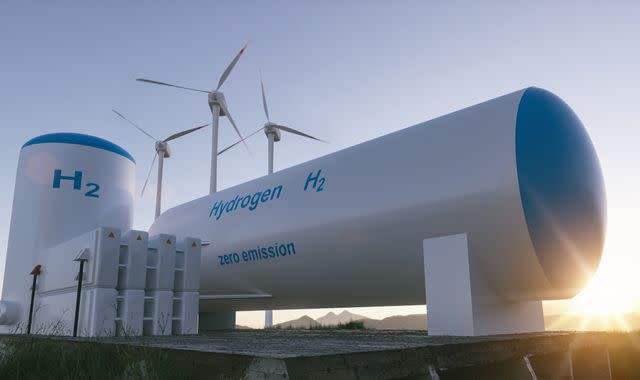Government energy plans to make hydrogen from fossil fuel will result in missed climate targets , says environmental group

New government plans to make hydrogen from natural gas could result in the UK missing its target for cutting carbon emissions to net zero, climate change campaigners have warned.
E3G, an environmental policy group, told Sky News that making blue hydrogen from fossil fuel will still result in significant greenhouse gas emissions - and the government should instead incentivise the use of solar and wind.
Juliet Phillips, a clean economy advisor at the think-tank, said: "We would encourage the UK to shift to as near to zero emissions technologies as possible.
"We need to avoid a high-carbon lock-in, in which we end up scaling blue without a clear pathway on to green.
"We could be locking in a high-carbon jobs infrastructure, which could result in the UK missing its climate targets."
The government's delayed hydrogen strategy sets an ambition of producing 5GW of 'low carbon' gas by 2030 to power heavy industry, buses and lorries, and heat some homes.
But it would allow producers to make blue hydrogen by processing natural gas, a technology that results in significant carbon emissions. Most, but not all, of those emissions would be captured and buried underground.
Government incentives should instead be directed to producing green hydrogen, which uses clean electricity to make the gas from water, E3G says.
"This is the technology of the future," said Ms Phillips.
The government says its new plan will kick-start a "world-leading hydrogen economy" that could be worth £900 million and create 9,000 UK jobs by 2030.
It will consult on a new incentive scheme for producers to increase the efficiency of hydrogen production and bring down prices.
A similar pricing mechanism has reduced the cost of wind energy over the last decade so that it is now cheaper than electricity generated using fossil fuels.
The government hopes that the scheme, backed with funding of £900 million, will result in enough low-cost hydrogen to fuel 20-35% of the UK's energy consumption by 2050.
Business & Energy Secretary Kwasi Kwarteng said: "Today marks the start of the UK's hydrogen revolution.
"This home-grown clean energy source has the potential to transform the way we power our lives and will be essential to tackling climate change and reaching net zero."
Under the government plans up to 20% hydrogen could initially be mixed into the existing gas supply to consumers' homes, with plans for a "hydrogen village" by 2025.
The government will also fund trials of hydrogen to power buses, lorries, aircraft and ships.
Professor Rob Gross, Director of the UK Energy Research Centre, said: "Hydrogen has the potential to be incredibly useful. It could literally reach the sectors other options can't, in industry and aviation.
"But we won't be able to use it everywhere all at once. The sheer volume of energy needed in single sectors, like domestic heating or transport, is immense.
"As well as figuring out how to make lots of clean hydrogen much more cheaply we will also need to decide where to use it first.
"The strategy makes a start on all of that but there is a long, long way to go."
Subscribe to ClimateCast on Spotify, Apple Podcasts, or Spreaker.
The strategy was welcomed by the energy company SSE, which has plans to make hydrogen on its wind farms, store it in underground caverns and fuel the world's first major hydrogen-fired power station at Keadby.
But it's not clear who will fund the cost of the transition to a hydrogen economy.
Doug Parr, Chief Scientist for Greenpeace UK, said consumers would question whether they should be funding the switch if hydrogen is made from natural gas.
"Asking householders to pay extra on their fuel bills to potentially increase their carbon emissions will not be popular with anyone apart from the gas companies," he said.
Sky News has launched the first daily prime time news show dedicated to climate change.
The Daily Climate Show is broadcast at 6.30pm and 9.30pm Monday to Friday on Sky News, the Sky News website and app, on YouTube and Twitter.
Hosted by Anna Jones, it follows Sky News correspondents as they investigate how global warming is changing our landscape and how we all live our lives.
The show also highlights solutions to the crisis and how small changes can make a big difference.

 Yahoo News
Yahoo News 
